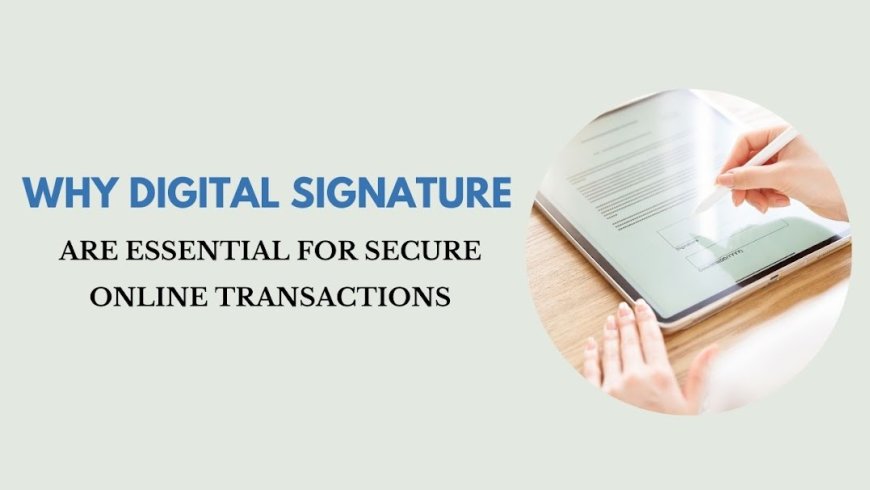Why Digital Signatures Are Essential for Secure Online Transactions
A digital signature is an important tool that keeps online transactions safe, secure, and trustworthy. In this guide, we will explain what digital signatures are,

In today’s digital world, people and businesses share important documents, contracts, and information online every day. Whether it’s signing a contract, filing government forms, submitting tax returns, or making business deals, many of these tasks are now done digitally. But when everything happens online, how can we be sure that the person sending or signing a document is genuine? How can we make sure no one has changed the document before it reaches us? The answer to these questions lies in something called a Digital Signature.
A digital signature is an important tool that keeps online transactions safe, secure, and trustworthy. In this guide, we will explain what digital signatures are, how they work, and why they are essential for secure online transactions in simple and easy-to-understand words.
What is a Digital Signature?
A digital signature is like an electronic version of a handwritten signature or a stamped seal, but it is much more secure. It is a type of code that proves the identity of the sender and ensures that the information in the message or document has not been changed during transmission.
In other words, a digital signature:
-
Verifies the identity of the person signing a document online.
-
Ensures that the content of the document has not been altered after it was signed.
-
Provides a secure and trustworthy way to conduct online transactions.
How Do Digital Signatures Work?
A digital signature works through a combination of advanced computer coding and cryptography (a method of protecting information). Let’s break it down simply:
-
Key Pair Creation
-
Every digital signature is created using a pair of keys: a private key and a public key.
-
The private key is used by the sender to sign the document.
-
The public key is used by the receiver to verify the signature.
-
Signing the Document
-
The sender’s computer creates a unique code (called a hash) based on the document’s contents.
-
This hash is then encrypted using the sender’s private key to create the digital signature.
-
The digital signature is attached to the document and sent to the receiver.
-
Verifying the Signature
-
The receiver uses the sender’s public key to decrypt the digital signature.
-
The receiver’s computer generates a new hash from the document’s contents.
-
If this hash matches the one decrypted from the digital signature, the document is verified as genuine and unchanged.
Why Are Digital Signatures Important for Online Transactions?
Online transactions involve sharing sensitive data like bank details, personal information, business contracts, and government forms. It is very important to protect this information from fraud, tampering, and misuse. Here’s why digital signatures are essential:
1. Proof of Identity
A digital signature confirms that the person signing a document is who they claim to be. This helps prevent identity theft and ensures that only authorized people can sign important papers.
2. Document Integrity
Digital signatures ensure that a document remains unchanged after it has been signed. If anyone tries to edit or alter the document after signing, the digital signature will become invalid, making tampering easy to detect.
3. Secure Communication
When sensitive documents or contracts are shared online, there is a risk of data being stolen, changed, or misused. Digital signatures provide strong protection by encrypting and securing the document, keeping it safe during transfer.
4. Legal Validity
In many countries, including India, digital signatures are legally recognized and valid for contracts, business deals, and government filings. This means a digitally signed document holds the same value as a handwritten one.
5. Saves Time and Money
Using digital signatures removes the need for printing, scanning, couriering, and physically signing documents. It speeds up transactions, saves paper, reduces costs, and makes business processes more efficient.
Where Are Digital Signatures Used?
Digital signatures are now commonly used in various industries and situations, including:
-
E-Government Services
For filing income tax returns, applying for licenses, and signing government documents.
-
Business Agreements
For signing contracts, agreements, and legal notices between companies, vendors, and clients.
-
Banking and Financial Transactions
For authorizing transactions, opening accounts, and signing loan documents securely.
-
Healthcare
For securing patient records, medical reports, and insurance claims.
-
E-Tendering and E-Procurement
For submitting bids and offers on government or corporate procurement platforms.
-
IT and Software Services
For protecting software codes, certificates, and agreements.
Types of Digital Signatures in India
In India, digital signatures are mainly categorized into three classes:
1. Class 1 Digital Signature
-
Used for verifying email IDs and usernames.
-
Not suitable for official documents or legal contracts.
2. Class 2 Digital Signature
-
Used for filing income tax returns, GST registration, and other government filings.
-
Verifies the identity of a person against a trusted database.
3. Class 3 Digital Signature
-
The highest level of security.
-
Used for e-tendering, e-procurement, online auctions, and legal contracts.
-
Requires physical presence verification of the applicant.
Advantages of Using Digital Signatures
Let’s look at the key benefits of using digital signatures:
-
High Security: Digital signatures use encryption techniques that make it very difficult for anyone to forge or alter a signed document.
-
Fast Processing: Documents can be signed and shared instantly without any need for travel, printing, or mailing.
-
Eco-Friendly: As digital signatures eliminate the need for paper, printing, and couriering, they help save the environment by reducing paper waste.
-
Cost Saving: By reducing paperwork, courier charges, printing, and storage expenses, businesses save money.
-
Legal Validity: Digitally signed documents are legally accepted and recognized by courts and government authorities.
-
Simple Verification: Anyone can easily check the validity of a digital signature using simple software tools.
Things to Keep in Mind While Using Digital Signatures
-
Always keep your private key and DSC token safe and secure.
-
Never share your digital signature password or PIN with anyone.
-
Renew your DSC before it expires to avoid delays in transactions.
-
Use trusted software and systems to sign and verify documents.
Suggested read- What is E-Mudra
Conclusion
Digital signatures have become an essential part of modern business and government operations. They make online transactions secure, fast, and trustworthy. By confirming identity, securing documents, and ensuring legal compliance, digital signatures help build confidence in digital dealings. For businesses, government departments, and individuals, using digital signatures is not only a smart choice but also a necessary step towards safer, faster, and paperless operations.
If you deal with sensitive online transactions, contracts, or official filings, getting a Digital Signature Certificate and using digital signatures is highly recommended. It helps protect your information, saves time, reduces costs, and gives you peace of mind in the digital world.






































































